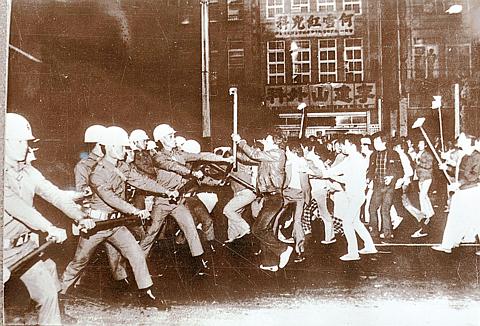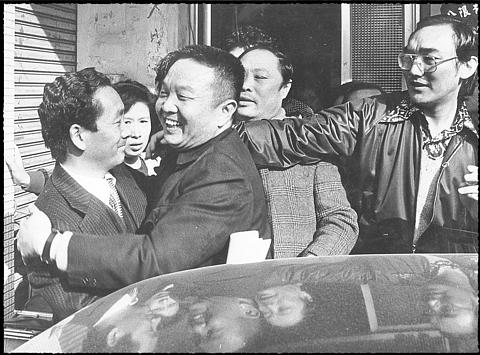"After it got dark, the atmosphere became increasingly eerie. Streams of people were everywhere, even in the side lanes. Ambulances were gathered near the traffic circle and the train station. You could also see dozens of riot control and tear-gas vehicles. The riot police were all wearing masks and holding shields ... outfits they had never used in previous tang wai rallies suddenly turned up."
-- Wang Li-shia (汪立峽), a participant in the Kaohsiung Incident ......
Twenty years ago today, Taiwan's democratic evolution was kick-started by an event that took place in its second-biggest city that came to be known as the Kaohsiung Incident.
Originally meant to be a march in commemoration of International Human Rights Day, the event devolved into a violent confrontation when members of the crowd unknown to the organizers began attacking police.
Perhaps more significant than the event itself, however, was its aftermath. A large-scale crackdown on political dissidents ensued, which resulted in the trial of the so-called Kaohsiung Eight. The trial, conducted in an open martial court (Taiwan was under martial law at the time), received intense media coverage, which was used by the defendants and their lawyers to spread their mission -- the end of one-party rule,martial law and political censorship of the media and the instiutution of free elections -- to an islandwide audience.

PHOTO: AP
The result was the building of public pressure on the government to end martial law, and democratize the political system.
The fruits that Taiwan has reaped in the past 20 years, in other words, had their seeds sown on that day in Kaohsiung.
Back in time

PHOTO: RICK CHU
Although the rally had originally been planned as simply a show of support for internationally respected principles of human rights, it took on a much stronger political tone thanks to the result of growing tensions between police and the event's organizers from Formosa magazine.
The magazine was a front for a broad alliance of the tang wai (
The day before the rally, two employees of the magazine were beaten up and arrested by the police while publicizing the coming event.
The beatings prompted Shih Ming-teh (
It came as little surprise, therefore, to Huang Shin-chieh (黃信介), the late former DPP chairman and then a tang wai legislator who was the magazine's publisher, that he was "greeted" upon his arrival that evening at the Kaohsiung train station by Chang Chi-hisu (常持琇), South District Commander of the Taiwan Garrison Command -- the body responsible for administering martial law.
Chang reportedly asked Huang to have his team of organizers cancel the march and not allow anyone to carry torches, in return for being allowed to conduct a series of public lectures in one designated place. Huang agreed.
According to Huang's account of events, when he arrived at the magazine's Kaohsiung branch, he was informed that Chang had not kept his word. The designated rally place, the Rotary Club Park, had been occupied by riot police accompanied by several riot-control trucks. Traffic had been prevented from entering the area for several hours already.
This account matches that provided by Kao Ming-hui (
"The first was to implement a `no bloodshed' command which had been handed down by `high authorities' -- which everyone knew was Chiang Ching-kuo himself," said Kao. "The second was to confine the scope of the rally, and to forbid the carrying of torches and contain any marching from taking place."
By the time Huang arrived at the scene, various estimates have put the crowd at between 10,000 and 30,000. Hundreds of riot police and dozens of riot-control vehicles were in attendance.
Due to the heavy police presence, the organizers moved the rally to the traffic circle on the intersection of Chungshan Road and Chungcheng Road (see map).
The crowd defiantly carried torches, which they said repre-sented the "fire of democracy and victory." Large banners were held with the words "against the oppression of labor and farmers," "abolish martial law" and "release political dissidents."
Huang was the first to speak. But a few minutes later, anxiety ran through the crowd when 36 anti-riot trucks approached and blocked all entry points to the circle. Over the following five hours, at least three clashes occurred with police.
Efforts by Shih Ming-teh and Yao Chia-wen (
The crowd soon discovered that there was little room in which to maneuver and, as it began moving up Chungcheng Road, it was quickly blocked off by hun-dreds of shielded riot police.
At that point, a group of unidentified men began to attack the police with poles. "But we don't know any of them!" said Chen Wen-po (
Annette Lu, then vice president of the magazine and now Taoyuan County magistrate, had suspicions about the unidentified demonstrators. "When the speeches began, I looked around and saw several young men with shaved heads and dark blue shirts, some of which had national flags embroidered on them. Suddenly people began tossing eggs onto the stage and one of them hit my face. I realized that it was a young shaven-headed man who had thrown it. And I sensed something strange about them," Lu recalled.
Her suspicions were held by others, too, such as Wang Tou (王拓), a staff member of the magazine and a current DPP legislator. "I heard there were men with shaved heads in the crowd, even though I did not personally see them. But there were many people holding torches and slogan ban-ners that I had never seen before. At that time, if people were participants in tang wai activities, I would have known all of them, because I had been going all over the island to organize events," he said.
What happened next was confused and chaotic. The crowd managed to break through the police blockade, and continued moving toward Formosa magazine's Kaohsiung branch office, closely followed by a heavy police presence. On Jeiyuan Road, a second round of clashes took place. Stones and bamboo rods rained onto the shields of the police, and dozens were soon left bloodied.
The organizers, sensing the panic in the crowd and fearing a complete loss of control, called for calm. "Stop fighting!" "Tai-wanese don't fight Taiwanese!" "Taiwanese soldiers retreat! Let them go! We're all Taiwanese!" Shih Ming-teh, Annette Lu and others recalled shouting.
Lu remembers the moment clearly in her book, Re-trial of the Kaohsiung Incident (
Around 9pm, three leaders of the magazine clambered atop a campaign truck and proceeded to control the crowd to a certain extent. They were Lu, Chang Chun-hung (
It took them until 10pm to reach the magazine's offices. But as they approached, another violent clash broke out.
Shouting was heard over loudspeakers from the riot-control trucks: "My brothers, if you love the country and the government, please back up and go home!"
It had little effect, as several trucks were overturned while the crowd pulled up railing fences to use as roadblocks.
The tense standoff continued until around midnight, when tear gas canisters were shot into the crowd.
Lu, Chen Chu (
Panic and chaos ensued until the crowd finally dispersed around two hours later.
The next day, the Garrison Command claimed that 183 police and one civilian had been injured in the incident.
To this day, the identities of the prime instigators of the violence have never been confirmed.

‘ABUSE OF POWER’: Lee Chun-yi allegedly used a Control Yuan vehicle to transport his dog to a pet grooming salon and take his wife to restaurants, media reports said Control Yuan Secretary-General Lee Chun-yi (李俊俋) resigned on Sunday night, admitting that he had misused a government vehicle, as reported by the media. Control Yuan Vice President Lee Hung-chun (李鴻鈞) yesterday apologized to the public over the issue. The watchdog body would follow up on similar accusations made by the Chinese Nationalist Party (KMT) and would investigate the alleged misuse of government vehicles by three other Control Yuan members: Su Li-chiung (蘇麗瓊), Lin Yu-jung (林郁容) and Wang Jung-chang (王榮璋), Lee Hung-chun said. Lee Chun-yi in a statement apologized for using a Control Yuan vehicle to transport his dog to a

INDO-PACIFIC REGION: Royal Navy ships exercise the right of freedom of navigation, including in the Taiwan Strait and South China Sea, the UK’s Tony Radakin told a summit Freedom of navigation in the Indo-Pacific region is as important as it is in the English Channel, British Chief of the Defence Staff Admiral Tony Radakin said at a summit in Singapore on Saturday. The remark came as the British Royal Navy’s flagship aircraft carrier, the HMS Prince of Wales, is on an eight-month deployment to the Indo-Pacific region as head of an international carrier strike group. “Upholding the UN Convention on the Law of the Sea, and with it, the principles of the freedom of navigation, in this part of the world matters to us just as it matters in the

BEIJING’S ‘PAWN’: ‘We, as Chinese, should never forget our roots, history, culture,’ Want Want Holdings general manager Tsai Wang-ting said at a summit in China The Mainland Affairs Council (MAC) yesterday condemned Want Want China Times Media Group (旺旺中時媒體集團) for making comments at the Cross-Strait Chinese Culture Summit that it said have damaged Taiwan’s sovereignty, adding that it would investigate if the group had colluded with China in the matter and contravened cross-strait regulations. The council issued a statement after Want Want Holdings (旺旺集團有限公司) general manager Tsai Wang-ting (蔡旺庭), the third son of the group’s founder, Tsai Eng-meng (蔡衍明), said at the summit last week that the group originated in “Chinese Taiwan,” and has developed and prospered in “the motherland.” “We, as Chinese, should never

The High Court yesterday found a New Taipei City woman guilty of charges related to helping Beijing secure surrender agreements from military service members. Lee Huei-hsin (李慧馨) was sentenced to six years and eight months in prison for breaching the National Security Act (國家安全法), making illegal compacts with government employees and bribery, the court said. The verdict is final. Lee, the manager of a temple in the city’s Lujhou District (蘆洲), was accused of arranging for eight service members to make surrender pledges to the Chinese People’s Liberation Army in exchange for money, the court said. The pledges, which required them to provide identification